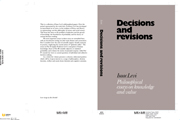Book contents
- Frontmatter
- Contents
- Preface
- PART I Cognitive decision making
- 1 Must the scientist make value judgements?
- 2 On the seriousness of mistakes
- 3 Corroboration and rules of acceptance
- 4 Deductive cogency in inductive inference
- 5 Information and inference
- 6 Epistemic utility and the evaluation of experiments
- 7 Abduction and demands for information
- PART II Knowledge and ignorance
- PART III Chance and surprise
- PART IV Decision making
- Bibliography of Isaac Levi
- Bibliography
- Index of names
- Index of subjects
1 - Must the scientist make value judgements?
Published online by Cambridge University Press: 26 March 2010
- Frontmatter
- Contents
- Preface
- PART I Cognitive decision making
- 1 Must the scientist make value judgements?
- 2 On the seriousness of mistakes
- 3 Corroboration and rules of acceptance
- 4 Deductive cogency in inductive inference
- 5 Information and inference
- 6 Epistemic utility and the evaluation of experiments
- 7 Abduction and demands for information
- PART II Knowledge and ignorance
- PART III Chance and surprise
- PART IV Decision making
- Bibliography of Isaac Levi
- Bibliography
- Index of names
- Index of subjects
Summary
The scientific man has above all things to strive at self-elimination in his judgements, to provide an argument which is true for each individual mind as for his own.
Karl PearsonTwo assumptions implicit in Pearson's characterization of ‘the scientific man’ have been called into question in recent years: (a) At least one major goal of the scientist qua scientist is to make judgements – i.e., to accept or reject hypotheses – and to justify his judgements, (b) The scientific inquirer is prohibited by the canons of scientific inference from taking his attitudes, preferences, temperament, and values into account when assessing the correctness of his inferences.
One currently held view affirms (a) but denies (b). This position maintains that the scientist does and, indeed, must make value judgements when choosing between hypotheses. The other position upholds the valueneutrality thesis (b) at the expense of the claim that scientific inference issues in the acceptance and rejection of hypotheses (a). According to this view, a scientific inquiry does not terminate with the replacement of doubt by belief but with the assignment of probabilities or degrees of confirmation to hypotheses relative to the available evidence.
In this paper, a critical examination of these conflicting conceptions of scientific inference will be undertaken; the prima facie tenability of the claim that scientists can, do, and ought to accept and reject hypotheses in accordance with the value-neutrality thesis will be defended; and some indication will be given of the kind of question that must be answered before this plausible view can be converted into a coherent and adequate theory of the relation of values to scientific inference.
Information
- Type
- Chapter
- Information
- Decisions and RevisionsPhilosophical Essays on Knowledge and Value, pp. 3 - 13Publisher: Cambridge University PressPrint publication year: 1984
